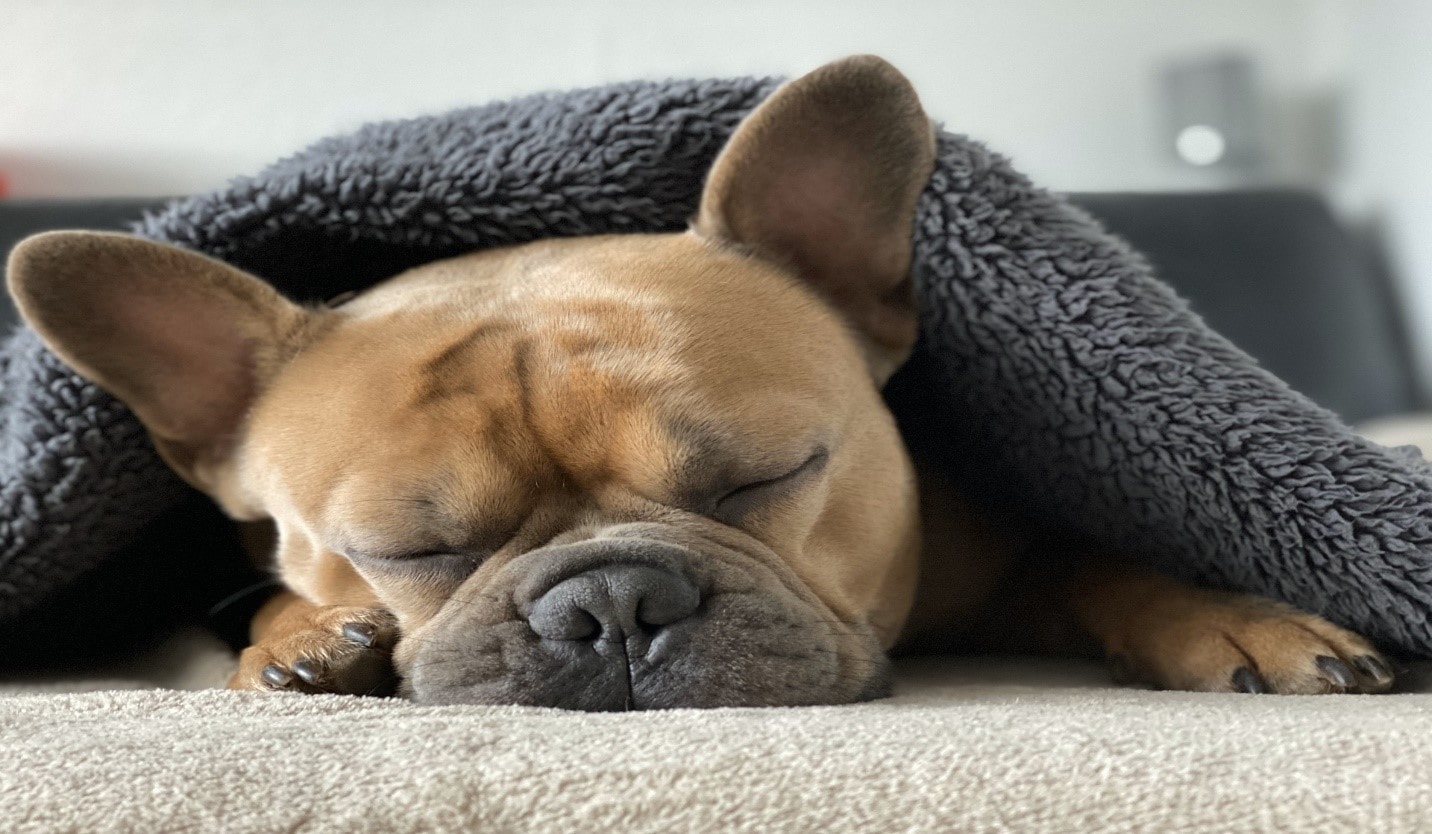If you are a dog owner, you may have seen your dog snoring while sleeping. And in some cases, puppy snoring can be louder than humans. No matter how much you love your dog, the loud snoring in dogs can be quite annoying especially if it is disturbing your sleep.
Whether you find snoring puppies adorable or irritating, you must be curious to know why it happens in dogs and what should one do in case of increased snoring in dogs.
What causes snoring in dogs?
Before knowing the causes of snoring in dogs, one should be aware of what snoring actually is and how is the sound produced. Snoring is simply a grouting and noisy sound created by the dog’s mouth due to the disruption of normal air movement in the airways. This blockage in the air causes resistance and vibration leading to noisy sound.
Snoring is common in senior dogs, but you can also find a three-week pup snoring while sleeping.
Why does my dog snore?
Blockage in the air passage, nasal issues, obesity, and weight issues are major reasons behind the dog’s snoring. Sleeping position, allergies, irritants, infections, etc. determine the extent of snoring in individual dogs.
Breeds with flat faces and little snouts are more prone to snoring than long-faced breeds. Dog’s lifestyle and eating habits are also a deciding factor regarding snoring in puppies.
Let’s take a detailed look at the reasons behind puppy snoring while sleeping.
Reasons Behind Snoring in Dogs
Below are the reasons that can be responsible for your puppy snoring through the night.
Physical characteristics of a particular breed
Dogs with flat faces, wide heads, and tiny snouts are notorious for loud snoring while sleeping in the middle of the night. Their predisposition to snoring and breathing issues is not difficult to guess by looking at their snub nose.
Snub-nosed dog breeds like Pug, bulldog, Shih Tzu, French bulldog, English toy Spaniel, Pekingese, Chow chows, and Boston terrier are the most common loud snorers and loud breathers with the cute snub faces.
They have a palate of almost the same size as in long or big-faced dogs, so a comparatively bigger palate than their mouth size creates disturbance during the passage of air. The bits of palates flap and vibrate back and forth while the air is drawn through them, which creates disturbing loud snoring sounds when passing through the small nose openings.
These dogs are the cutest fidos ever, and you can’t resist buying them because of their weird but cute smile and loyalty. So, if you plan to add up a four-legged friend in your family from snub nose dog breeds, make sure you are patient enough to bear this snoring nuisance.
Obesity and Weight issues
Apart from natural predisposition due to breed characteristics, obesity and weight issues are two of the leading factors that can result in your puppy snoring and breathing loudly. Always keep one ear up to check for abnormalities due to obesity and weight issues. Excessive body fat can compress the air passageways and put more pressure on the rib cage, ultimately making a louder sound when it passes through the palate.
Keep an eye on your dog’s weight. Feeling its spine without pressing it through the muscle mass is approximately normal; otherwise, your puppy might have packed some extra pounds on its body.
Help your dog shed extra weight by planning a proper diet table and exercise schedule. Keep your furry friend busy in healthy activities, walking and playing fetch. You can give toys to your dog that will provide mental stimulation as well.
Sleeping position
The dogs that love to lie sprawled on their legs back are more susceptible to snoring than those who prefer to choose other positions to sleep. The sleeping position has a profound influence on the flow of air, and the back sleepers mostly face difficulty in breathing.
The throat of back sleepers is mostly blocked by their tongue and bent neck, which causes difficulty in breathing and thus leads to snoring. Similarly, the shape and neck position during sleeping can lead to the blockage of air.
Allergies and Irritants
Infections by different allergens and environmental irritants can result in increased snoring in your dog. Airway congestion, inflammation of the respiratory tract, nasal congestion, build-up of nasal secretion in the nose, and post-natal drips are some of the reasons for snoring in dogs and are mostly caused by allergens.
Just like humans, it’s not out of the norm for dogs to be allergic to different allergens like dust, pollens, mold, spray, dander, fragrances, perfumes, smoke, home cleaners, detergents, etc.
If you notice your dog is snoring with sudden nasal drainage, coughing, wheezing, and snoring, it may be due to a cold or flu due to any type of irritant. It should be kept in mind that these can be caused by a bacterial or viral pathogen as well.
The immune system triggers mucus and other respiratory tract secretions to act as defenders against different allergens and irritants. The presence of these secretions in the respiratory tract is one of the causes of snoring in dogs.
If your dog starts snoring out of the blue, without any history, it’s time for a visit to your vet.
Age of Dog
It’s normal for senior dogs to snore because of complete and partial laryngeal paralysis. The main cause of laryngeal paralysis is the aging of nerves. So, the floppy larynx then blocks the air passage, mostly observed in senior dogs.
It can be accompanied by mucus, pus, or blood drainage from the dog’s mouth or nose though not always.
Airway obstruction
It’s more alarming than all the above-mentioned reasons, and in this case, a visit to the veterinarian is a must. If your dog starts snoring suddenly, it may be because of the clogging of the airways and nose because of grass, seed, or any food. More alarming than this could be the sign of a tumor in the nose, palate, and throat.
When should I worry about puppy snoring?
It’s not very alarming in most cases; you can rest assured that snoring in dogs is as normal as in humans. Despite this, there are certain cases when you have to be more conscious.
If your dog is a happy pup and enjoys trips here and there without any health issues and is not a very senior dog, then if it suddenly starts snoring while sleeping, it could be a troubling sign. In such a case, it is recommended not to show laziness anymore, and it’s time to see your pet’s veterinarian.
How to stop snoring in dogs?
There are several ways to ward off puppy snoring that can be very helpful, not just for pet owners but also for the dogs. Which method will be most effective in stopping snoring in a dog depends on the reason for snoring. In any case, your vet is the best person to consult with.
It’s not a serious issue in most cases but in some cases, surgery may be needed.
Stenotic nares are the nostrils that collapse during the inhalation and exhalation process. So clearing them can help get rid of this issue, and it can be done at the age of six months by an augmentation surgery to open the dog’s airways.
The shortening of elongated short palates and everted laryngeal saccules are some of the surgical treatments against snoring in dogs.
- Change the sleeping position of your dog
- Prefer round bed
- Avoid different medications that cause snoring
- Airway blockage removal
- Dental care is necessary
- Detect the signs of infections, allergies, and irritations
- Enrich healthy diet
- Develop a healthy lifestyle
- Ensure proper exercise, walk, physical activities, and games
- Use a humidifier
- Use an air purifier
- Ensure clean bedding
- Use a pillow
- Use snore stopping medication
Final Words
Puppy snoring is not out of the norm, so you can rest assured it’s not very irksome for your dog in normal cases, but it is something to worry about when it disturbs your or your dog’s normal sleeping.
Most common reasons for snoring in dogs include
- Breed characteristics i.e. shape of nose and mouth
- Allergens
- Increased age i.e. reduced elasticity in the air tract
- Sleeping position of the dog
It’s not rare for senior dogs to snore due to the worn-out nerves and less elasticity in air tracts. But if your dog expels out the pus or blood from its mouth or nose, then reach out to your veterinarian to diagnose the actual cause immediately.
If your dog starts snoring out of a sudden without any previous snoring history or age issue, the problem could be more serious than a minor issue. Similarly, your dog may be seen barking, whining, or panting at night. These aren’t normal and you should go for a dog’s check-up.
I hope the information from this article will help you take better care of your dog. If you have any questions, you can always ask in the comments or through the mail.
Thank you for reading!


